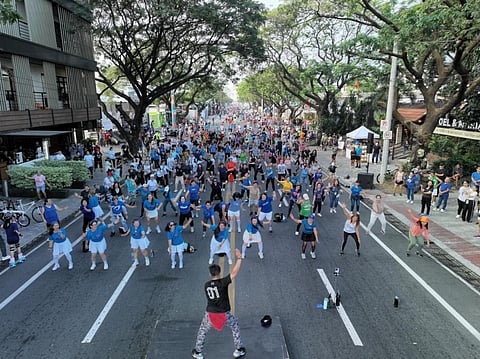
- NEWS
- the EDIT
- COMMENTARY
- BUSINESS
- LIFE
- SHOW
- ACTION
- GLOBAL GOALS
- SNAPS
- DYARYO TIRADA
- MORE

Metro Manila is seeing a growing trend of local governments designating streets as car-free zones on Sundays, a move that promotes sustainable transport, public health and community engagement.
Marikina City has joined the Car-Free Sunday movement by closing part of Gil Fernando Avenue every Sunday from 6 a.m. to 10 a.m. The initiative strengthens its commitment to people-friendly, green urban spaces.
With 52 kilometers of interconnected bike lanes, the Marikina City government is shaping a city where cycling and walking would be a way of life.
“We are promoting walking and biking to school and work. This is one way of giving residents a safe space where they can bond with their families and friends,” Marikina City Mayor Marcelino Teodoro said.
In Quezon City, the local government’s “Car-Free, Carefree Tomas Morato Sundays” closes a stretch of Tomas Morato Avenue to motor vehicles every Sunday morning, allowing residents to walk, bike and enjoy the open space.
Similarly, in Manila, Roxas Boulevard has been designated car-free under Ordinance 9047, providing dedicated lanes for cyclists and joggers along a 2.3-kilometer stretch from 5 a.m. to 9 a.m. every Sunday.
In Makati City, the local government’s initiative on Ayala Avenue has transformed one of the busiest business districts into a pedestrian-friendly zone on Sundays, while Mandaluyong City’s Greenfield District and Taguig City’s Fifth Avenue in Bonifacio Global City offer weekend car-free spaces for recreation and fitness activities.
Pasig City is also implementing its People’s Streets program, which turns multiple streets into pedestrian-friendly spaces on Sundays. Other areas, such as UP Diliman in Quezon City and Filinvest City in Muntinlupa City, have long embraced the car-free movement, encouraging healthier and more sustainable lifestyles.
The movement has also expanded outside Metro Manila. In Davao City, Car-Free Sundays started in December 2024 along the Coastal Road, running from 4 a.m. to 8 a.m. This initiative promotes an active lifestyle and enhances public well-being by offering residents a safe space for jogging, walking and cycling.
With a growing list of local government units (LGUs) adopting car-free programs — including Cebu City, Iloilo City and Baguio City — this movement reflects a nationwide shift toward sustainable urban planning and healthier public spaces.
“The Philippines has the potential to become a cleaner, more resilient and people-first region by prioritizing sustainable mobility,” said Climate Change Commission vice chairperson and executive director Robert E.A. Borje.
